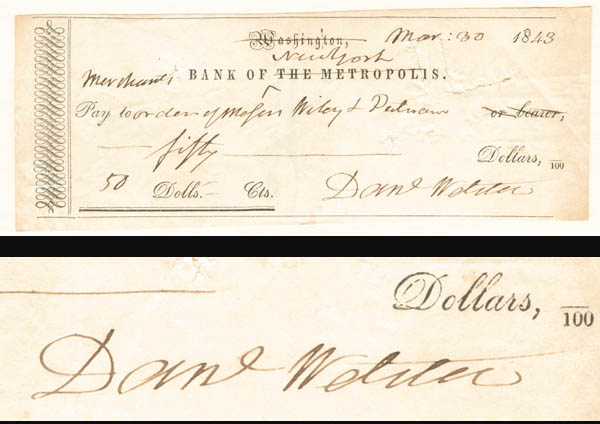Daniel Webster signed Check
Inv# AU1119
Years:
1843
Daniel Webster (January 18, 1782 – October 24, 1852) was an American statesman who represented New Hampshire and Massachusetts in the United States Congress and served as the United States Secretary of State under Presidents William Henry Harrison, John Tyler, and Millard Fillmore. He was also a prominent attorney, especially during the period of the Marshall Court. Throughout his career, he was a member of the Federalist Party, the National Republican Party, and the Whig Party.
Born in New Hampshire in 1782, Webster established a successful legal practice in Portsmouth, New Hampshire after undergoing a legal apprenticeship. He emerged as a prominent opponent of the War of 1812 and won election to the United States House of Representatives, where he served as a leader of the Federalist Party. Webster left office after two terms and relocated to Boston, Massachusetts. He became a leading attorney before the Supreme Court of the United States, winning cases such as Dartmouth College v. Woodward, McCulloch v. Maryland, and Gibbons v. Ogden. Webster returned to the House in 1823 and became a key supporter of President John Quincy Adams. He won election to the United States Senate in 1827 and worked with Henry Clay to build the National Republican Party in support of Adams.
After Andrew Jackson defeated Adams in the 1828 presidential election, Webster became a leading opponent of Jackson's domestic policies. He strongly objected to the theory of nullification espoused by John C. Calhoun, and his Second Reply to Hayne speech is widely regarded as one of the greatest speeches ever delivered in Congress. Webster supported Jackson's defiant response to the Nullification Crisis, but broke with the president due to disagreements over the Second Bank of the United States. Webster joined with other Jackson opponents in forming the Whig Party, and unsuccessfully ran in the 1836 presidential election. He supported Harrison in the 1840 presidential election and was appointed secretary of state after Harrison took office. Unlike the other members of Harrison's Cabinet, he continued to serve under President Tyler after Tyler broke with congressional Whigs. As secretary of state, Webster negotiated the Webster–Ashburton Treaty, which settled border disputes with Britain.
Webster returned to the Senate in 1845 and resumed his status as a leading congressional Whig. During the Mexican–American War, he emerged as a leader of the "Cotton Whigs," a faction of Northern Whigs that emphasized good relations with the South over anti-slavery policies. In 1850, President Fillmore appointed Webster as secretary of state, and Webster contributed to the passage of the Compromise of 1850, which settled several territorial issues and enacted a new fugitive slave law. The Compromise proved unpopular in much of the North and undermined Webster's standing in his home state. Webster sought the Whig nomination in the 1852 presidential election, but a split between supporters of Fillmore and Webster led to the nomination of General Winfield Scott. Webster is widely regarded as an important and talented attorney, orator, and politician, but historians and observers have offered mixed opinions on his moral qualities and ability as a national leader. This check is dated Mar. 30, 1843 and beautifully signed at the bottom by Daniel Webster. Nice!
Condition:
Excellent
Item ordered may not be exact piece shown. All original and authentic.











Ebay ID: labarre_galleries